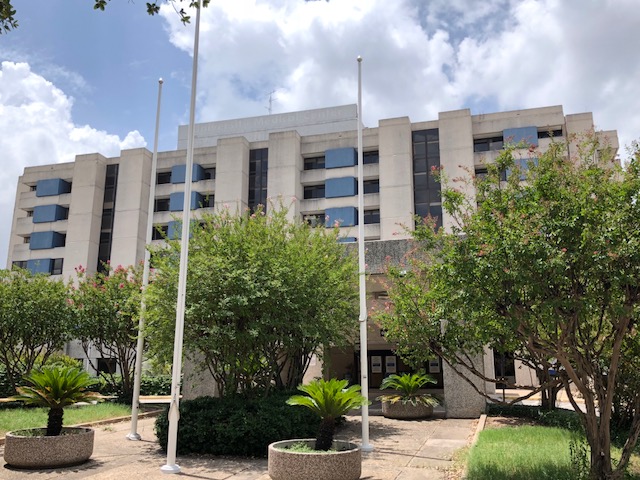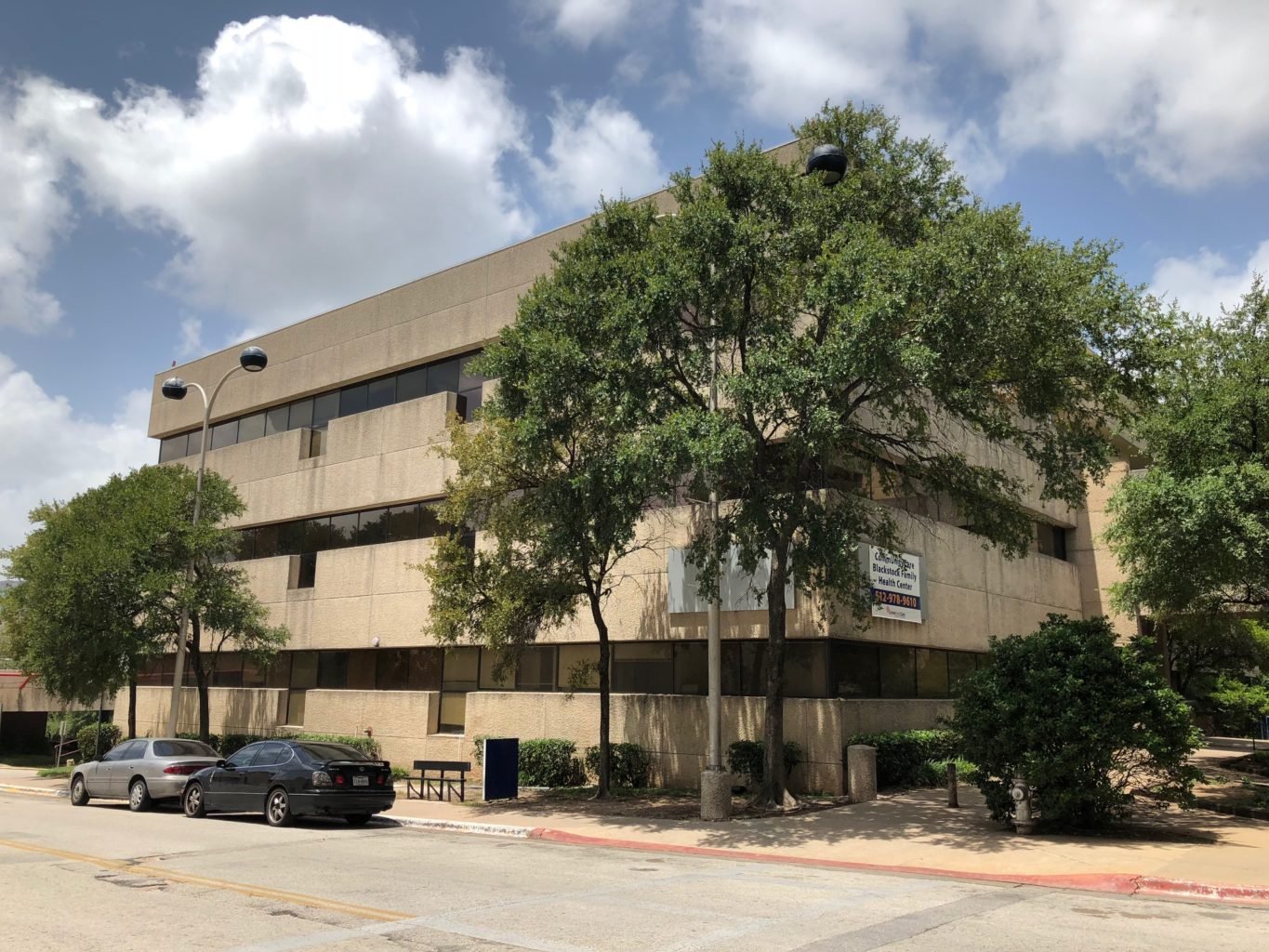Two blocks of the 14.3-acre campus tract leased to limited partnership that won’t profit
Part 8 in a Series
Posted Tuesday July 17. 2018 10:00am

When the Seton Family of Hospitals packed up and left the University Medical Center Brackenridge campus to move across 15th Street and open its new teaching hospital, it created a $30 million hemorrhage in Central Health’s annual revenue stream. That was the rent Seton had been paying to use the Brackenridge Hospital property owned by Central Health.
Now a new deal’s crimping but not closing that spurting financial artery. The University of Texas Board of Regents, the Travis County Commissioners Court, and Central Health have approved a lease that would provide a far smaller but much needed revenue addition to the agency that by law is solely responsible for funding indigent healthcare services in Travis County.
But a nagging question have been raised about Central Health tying up two blocks of valuable downtown real estate in a 99-year lease without soliciting competitive bids, as Travis County did before signing a lease for its property at 308 Guadalupe.

The deal to lease Blocks 164 and 167, totaling about 2.5 acres of the 14.3-acre campus, will yield an upfront payment of $6.6 million and ongoing rent totaling $1,425,000 a year. Because the deal includes an annual rent increase of 2 percent, over the 99-year term of the lease, Central Health would garner income totaling about $450 million, Steven Lamp, Central Health’s vice president for real estate and facilities, told The Austin Bulldog.
That 2 percent annual boost in rent is a major factor. If the rent never increased, the 99-year lease would yield a total of slightly more than $141 million. “That’s the power of compounding,” Lamp said.
Still, $450 million is a far cry from the $2.97 billion that would have accrued were Central Health able to continue collecting $30 million per year over a period of 99 years.
On Tuesday, July 10, both the Travis County Commissioners Court and Central Health’s Board of Managers each approved The 2033 LP lease.
The University of Texas Board of Regents had already approved in late February a sublease of the property from The 2033 LP. Specifically the improved land on Blocks 164 and 167 including, but not limited to, the site of the existing medical facility known as the Hospital Tower “for future programmed campus expansion and sublease of space to third parties.”
Then on July 11—the day after the Commissioners Court and Central Health approved The 2033 LP lease—the Board of Regents approved “expansion of the sublease of the proposed office building with related parking facilities on Block 164 including prepayment of a portion of the sublease.”
Questions about no-bid lease

Attorney Bill Aleshire, a former Travis County judge, notified the Travis County Commissioners Court before it voted to approve The 2033 LP lease that competitive bids should have been sought.
He points to the fact that the downtown block at 308 Guadalupe, currently being used as a parking lot, is owned by Travis County. Before that block was leased for 99 years the county sought and obtained competitive bids. Travis County issued a Request for Development Proposals for the property September 14, 2016. Then on July 12, 2017, the county entered a 99-year ground lease with LO/PPC OP Guadalupe LLC. (Copies of these documents are linked below.)
The 308 Guadalupe lease required an initial payment of $13.4 million to Travis County. In effect, that’s five years rent at $2.68 million a year. Annual rent for years six to 10 is $2.772 million. Thereafter rent is to increase by 5 percent on the 11th anniversary and every five years thereafter.
Nevertheless, the Commissioners Court did not require Central Health to obtain competitive bids before entering The 2033 LP lease.
(Disclosure: Aleshire has represented The Austin Bulldog in two public information lawsuits against the City of Austin for its failure to comply with the Texas Public Information Act.)
Commissioners Court approved
The Travis County Commissioners Court met July 10, 2018, to discuss the proposed lease.

Commissioner Gerald Daugherty asked if Central Health had obtained an opinion about the legality of making a 99-year lease on the property without seeking competitive bids.

Mike Geeslin, president and CEO of Central Health, told commissioners that the lease had been reviewed by both in-house and outside legal counsel.
On the question of competitive bidding, Geeslin said that interested “developers could submit any number of permutations of proposals for this tract” in response to the RFP issued by the agency. “So there was competitive bidding on the front end of this process.”
Geeslin said that Central Health heard from The 2033 Fund in late 2017, after it had started negotiations with the selected developer, “and there was a very competitive process on the front end.”
Daugherty was satisfied with that response.
Geeslin said that Central Health’s Board of Managers had been briefed on every aspect of the lease under attorney-client privilege.
The RFQ and RFP issued by Central Health clearly stated the agency had the right to negotiate a separate deal for any or all of the Brackenridge property, Geeslin said. So at any time the agency could take any portion of the property and negotiate in a way that’s in the best interest of Central Health. “The parties were put on notice we could exercise this option.”

Commissioner Brigid Shea asked if Central Health had obtained an opinion about the legality of a 99-year lease. She said that Aleshire had warned that granting a 99-year lease is like a sale and may be illegal.
Assistant County Attorney Tom Nuckols said, “I would disagree with that. Ninety-nine-year leases are fairly standard. We gave a 99-year lease on 308 Guadalupe.”
“That answers my question,” Shea said.
Daugherty moved approval. Shea seconded.
Shea said that since Central Health no longer gets lease revenue from Seton for the Brackenridge campus, “It is crucial that source of revenue be replaced. And it looks as though with a 99-year lease you will be replacing that source of revenue.”

Cynthia Valadez, a member of Central Health’s Board of Managers, responded to say that Shea was “exactly on point.”
When the plan for redevelopment of the entire campus did not pan out, she said, the board’s concern was how to fund services for indigent healthcare as required by state statutes.
“The biggest overall compelling reason for us to even consider this is because we need to put money in our treasury,” Valadez said. “We need to be able to provide services, and where is that money going to come from?”
“We’re hoping this will provide us a little bit of breathing room,” Valadez said.
She noted the redevelopment to take place under The 2033 LP lease will not cause the Brackenridge Campus to look like it was envisioned in the Master Plan presented to the public, “but this is our reality. We need to take care of our fiduciary responsibility. That’s why we’re here.” (A copy of the Master Plan is linked below.)
The motion passed unanimously on a vote of 4-0 with Commissioner Margaret Gomez absent.

In answering follow-up questions posed by The Austin Bulldog, County Judge Sarah Eckhardt said in an email, “The Board’s decision to negotiate a lease with 2033 LP is a lawful and reasonable way to monetize Central Health real estate for greater investment in the health care.”
Commissioner Shea responded via email too, saying, “I did not realize that we could turn down the plan if it was not competitively bid. But my understanding was they had gone through a competitive bidding process, selected the best offer, and found that the builder was seeking amendments that would have made the development deal less of a revenue generator for them. That’s the chief reason I voted for it. They have to replace revenue and this looked like the best option they had.”
Central Health defends no-bid lease

When The Austin Bulldog on July 13 asked Central Health for a response as to the legality of entering a 99-year lease without seeking competitive bids, Ted Burton, Central Health’s vice president for communication, responded in an email as follows:
“The Central Health Board of Managers received and acted upon legal advice in deciding to pursue a lease with The 2033 LP. Succinctly, the legal advice was:
“Chapter 281 of the Texas Health & Safety Code gives Central Health the authority to enter into a lease agreement for all or a portion of the Downtown Campus with whomever they desire, including a nonprofit, without underdoing (sic) a competitive bidding process. Section 281.0511 specifically authorizes Central Health to lease vacant real property for a period of not more than 99 years with the approval of the Commissioners Court. Subsection (d) of that section, which was added in 2015 in anticipation of the opening of a new teaching hospital, states:
“(d) Notwithstanding any other law, the board may, with the approval of the commissioners court at a meeting subject to Chapter 551, Government Code, lease undeveloped or vacant real property for not more than 99 years to provide for the development and construction of facilities designed to generate revenue for the financial benefit of the district. The board, directly or through a nonprofit corporation, may contract or enter into a joint venture with a public or private entity as necessary to enter into a lease under this subsection.”
That response does not address the fact that the Professional Office Building on Block 164 is not vacant. But plans indicate it will be soon.
Defense doesn’t address benefit of competitive bidding
Aleshire said, “I don’t think what CH is doing with The 2033 LP lease is legal, but even if it is: Isn’t it the ultimate duty of our elected officials to see that, in such matters, they achieve the most benefit to taxpayers? And if they don’t use a wide open process to solicit competitive bids, how will anyone know that’s what they did?”
“The notice and bidding requirements stimulate competition, prevent favoritism, and secure the best price for the property,” he wrote, citing case law in Bell v. Katy Independent School District [944 S.W.2d 862, 866 (Tex. App.—Houston 1st Dist. 1999 no pet.]
“Every taxpayer in Travis County should be angry that Central Health is not required to use competitive bids to ensure that the taxing entity gets the best deal for taxpayers,” Aleshire said.
Middleman on lease will take no profit

The 2033 LP is a limited partnership formed February 13, 2018, according to records of the Secretary of State. The 2033 LP’s general partner is The 2033 Fund, a Texas nonprofit corporation formed December 11, 2017, whose board of directors are Sanford L. “Sandy” Gottesman, his wife Lisa T. Gottesman, and son Grant M. Gottesman.
Central Health announced that Gottesman formed The 2033 Fund and The 2033 LP for the benefit of UT Austin and Dell Medical School at UT Austin “at no economic gain or profit for himself.”
The lease calls for annual rent of $610,000 for Block 164 and $815,436 for Block 167, for a total annual base rent of $1,425,436. Base rents, once commenced, will increase by 2 percent per annum.
Because rents will be reassessed at 15-year intervals to adjust to current market rates, Gottesman said the lease income could go higher.
 Professional Office Building on Block 164 at 1313 Red River St.The 2033 LP will prepay the first three years of base rent for Block 164, for a total of $1.83 million, such rent to commence when all tenants of the Professional Office Building located there have vacated or January 1, 2019. Current tenants include Blackstock Family Practice Academic Associates and a CommUnity Care Clinic, according to outdoor signage.
Professional Office Building on Block 164 at 1313 Red River St.The 2033 LP will prepay the first three years of base rent for Block 164, for a total of $1.83 million, such rent to commence when all tenants of the Professional Office Building located there have vacated or January 1, 2019. Current tenants include Blackstock Family Practice Academic Associates and a CommUnity Care Clinic, according to outdoor signage.
Lamp said Central Health has until the end of this year to decide if it wants to repurpose the Tower, which covers the entire southern edge of Block 167. If not, there is an option for The 2033 LP to prepay rent for Block 167 and that money would then be used to pay for demolition of the structure.
He said there is a user premium for Block 164 for $1.35 million payable in a lump sum whenever construction starts.
There is a user premium for Block 167 as well, he said, in an amount that is variable, depending on the size of the building and the timing of when project construction starts. The premium starts at $2.66 million and steps up from there in five-year increments as additional payments will be required in the event that construction of improvements is delayed beyond specified deadlines, Lamp said. (For details see Initial Revenue Summary, linked at the bottom of this story.)
Board of Managers discussion, approval
Lamp briefed the Board of Managers at a special-called meeting the evening of July 10 and received lavish praise for his work in negotiating the complex lease with The 2033 LP, as did Gottesman, who was present.
Lamp told the managers that the tenant will be responsible for all maintenance on the property. Central Health will be financially responsible for structural issues. Taxes, if any, would be the responsibility of The 2033 LP.
Manager Valadez said she appreciated that the entities involved in negotiating the lease worked to see that money comes in to serve the agency’s statutory population.
She asked what effect, if any, income from the 2033 LP lease would have on the agency’s tax rate. Geeslin said a lot depends on the budget going forward, but this “takes some pressure off the tax rate.”

Valadez mentioned the $30 million in revenue lost when Seton vacated the Brackenridge Campus. In response, Manager Katrina Daniel said that Seton’s construction of the new hospital represented a “cost avoidance” for Central Health. She said the agency’s tax rates are lower than other healthcare districts in the state that own and operate their own hospitals.
“We have the lowest tax rate because this shifts costs to Seton.”
Daniel added that when the City of Austin owned and operated Brackenridge “they were drowning in debt and losing money.”
Valadez asked if Central Health had analyzed the financial advantages of selling the property instead of leasing it. Lamp said it had done so, but added, “We didn’t spend a lot of time on it because we were looking at a long-term lease.”
Geeslin said, “Aside from those two blocks (in The 2033 LP lease) sale is still possible on the other properties. That’s certainly an option.” Further, he said, anyone responding to the original Request for Proposals could have submitted a proposal for outright purchase.
“Even at this juncture and not using a single preferred master developer, that doesn’t mean development would not be consistent with the master plan,” Geeslin said.
Lamp said that Central Health cannot guarantee equity as sought in the master plan, but marketing is still possible. He said that both HEB and Whole Foods had shown interest in the Brackenridge Campus. “In the right conditions, they would like to be at this location,” he said.
“We have the right to sell these parcels at any time,” Lamp said.
After a short executive session behind closed doors, the board reconvened and voted to approve The 2033 LP lease.

Of the five board members present, Chair Guadalupe Zamora, Daniel, and Valadez voted aye. Managers Abigail Aiken and Shannon Jones abstained. Aiken works as an assistant professor at the LBJ School of Public Affairs. Jones said he had a “relationship” but not a contract with UT.
Managers Charles Bell, Sherri Greenberg, Maram Museitif, and Julie Oliver were absent.
2033 lease adds to existing campus revenue
The Seton Healthcare Family continues to lease and pay annual rent of approximately $8,881,000 on the Brackenridge Campus for these properties:
Parking garage—Block 168 on the northwest corner of 15th and Red River Streets is the site of a parking garage that supports operation and certification of the University of Texas Dell Medical Center across 15th Street.
Clinical Education Center—The Original Hospital Block on the northeast corner of 15th Street and I-35, along with Block 166 on the southeast edge of Central Health’s campus, include a Clinical Education Complex used for training and clinical services, plus an adjacent garage. Austin Cyberknife, a department of Dell Seton Medical Center of the University of Texas, is also housed in the Clinical Education Center.
Burton in an email stated these blocks are leased through September 2024 but the garage at 15th and Red River has options to extend the lease for some 88 years.
The combined annual rent for these properties is much higher because these blocks have usable structures, he said, whereas The 2033 LP lease is based on the land value alone.
Gottesman told The Austin Bulldog that finalizing The 2033 LP lease with UT means that five of the six blocks on the Brackenridge Campus will be producing revenue for Central Health.
“That’s a better deal than leasing the entire site to a master developer,” he said, referring to the fact that the board had previously authorized negotiations with Wexford Science &Technology LLC to be the preferred master developer. But negotiations broke off after just four months.
On February 21, 2018, Central Health announced that Wexford had withdrawn from consideration to be the master developer and the agency was negotiating with The 2033 Fund.
Don’t miss another scoop. Sign up for our free Bulldog News Alerts.
Links:
Central Health 2033 LP Ground Lease Initial Revenue Summary (1 page)
Central Health Brackenridge Campus Master Plan, January 27, 2016
Central Health Downtown Campus 2033 LP Ground Lease Diagram with Blocks 164 and 167 subject to the lease shaded in blue (1 page)
Central Health Brackenridge Campus Diagram (1 page)
Ground Lease between Travis County Healthcare District dba Central Health and The 2033 LP, Draft 2, July 3, 2018 (91 pages)
Ground Lease between Travis County, Texas and LO/PPC OP Guadalupe LLC, July 12, 2017 (50 pages)
Request for Development Proposals for 308 Guadalupe Street Development Services, September 14, 2016 (52 pages)
Related Bulldog coverage:
Central Health Sponsorships Top $200,000: New spending adds $88,000 to the total having no connection to indigent healthcare, Part 7 in a Series, May 2, 2018
Dining and Shining on Taxpayer Dollars: Central Health spent more than $111,000 for sponsorships that have nothing to do with providing indigent healthcare, Part 6 in a Series, March 30, 2018
Central Health’s Checkup Delivered: Consultants delivered performance review completed eight months after contract let, Part 5 in a Series, February 14, 2018
Lawsuit Challenges Central Health Spending: Plaintiffs argue it is not legal to give $35 million a year to the UT Austin Dell Medical Center, Part 4 in a Series, October 18, 2017
Critic: Proposed Financial Policies “’Pointless’: Commissioners Court will vote tomorrow on Central Health financial policies for FY 18, Part 3 in a Series, October 9, 2017
Central Health Financial Policies Hotly Debated: $185 million given to Dell Medical School and Seton, with little to show for indigent healthcare, and $55 million more is on the way for FY 2018, Part 2 in a Series, September 29, 2017
Central Health Feedback Meetings Ill-Attended: Two public forums to gather opinions about the agency drew just nine speakers, Part 1 in a Series, August 27, 2017
Trust indicators:
 Ken Martin has been covering local government and politics in the Austin area since 1981. See more on Ken on the About page. Email[email protected].
Ken Martin has been covering local government and politics in the Austin area since 1981. See more on Ken on the About page. Email[email protected].
Who funds this work? This report was made possible by contributions to The Austin Bulldog, which operates as a 501(c)(3) nonprofit for investigative reporting in the public interest. You can help support this independent coverage by making a tax-deductible contribution.
An alphabetic list of donors who have contributed to The Austin Bulldog since the organization was formed in 2009 and the cumulative amount each person has given through April 2018, are listed on the Contribute page.
Comments are welcome: If you would like to post your reaction to this story, please do so on the Bulldog’s Facebook page.







